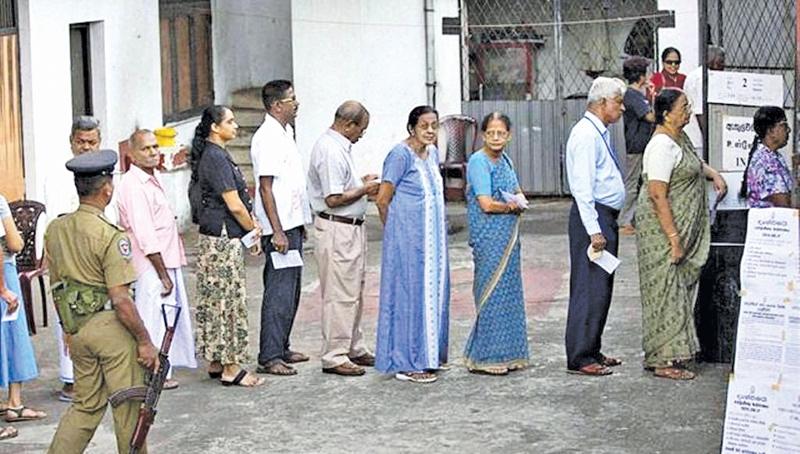

The stage is now set for the Local Government election battle 2018 with political parties depositing money and submitting nomination papers for LG bodies across the island.
The election will be held under a new electoral system and it will certainly be a new experience not only for the voters but also for political parties as Sri Lanka has not experienced the first past the post system in three and a half decades.
The highly competitive Proportional Representation system, introduced in 1978, has created an unbridgeable gap between the voters and their representatives, turning politics into a rich man’s game.
The new electoral system, introduced by the national unity government fulfilling one of its key campaign promises, is aimed at bridging this gap and restoring the long-lost values in the Sri Lankan political domain.
In this context, it is important to assess where the main political parties stand at the starting point of the electoral race.
UNP

The United National Party, the party which played the most crucial role in toppling the Rajapaksa administration, joins the electoral race as the hot favourite.
As the party leading the ruling coalition, the UNP enters the election campaign with a certain edge over others and its election machinery is in full swing following a successful island-wide election campaign in August, 2015.
It goes without saying that the UNP ran into difficulties during Local Government and Provincial Council elections in the past as the Rajapaksa administration blatantly and unabashedly utilized the state machinery and state resources for campaigning.
The UNP, which was then in the opposition, did not have enough muscle to counter this practice and as a result, the party had to finish the race without much success.
Driving seat
Today, fortunes have reversed and the UNP is in the driving seat with thousands of potential candidates lining up near Sirikotha, the party headquarters, seeking opportunities to contest the election on the UNP ticket.
Another reason why the UNP lost elections in the past was that its hardcore supporters were disappointed with the internal divisions, and power struggles among the top-tier leadership of the party.
It also discouraged ‘swing voters’ from voting for the UNP as they believed the party was not in a position to make an impact. Some refrained from voting for the party thinking a party that cannot maintain ‘unity’ internally, will never establish national unity and harmony in the country.
This negative mindset dramatically changed in the run up to the last Presidential election. All the top-rung leaders got together and established unity within the UNP camp sending a powerful message to the party rank and file.
The confidence of the party hardcore supporters went sky high when they saw unity in the party and that was one of the primary reasons for the party’s success at the last two national level elections.
Benefits
 Apart from the confidence factor, what will really work in the UNP’s favour is the fact that the people are more inclined to elect Local Government representatives who can work in collaboration with the central government. This collaboration will ensure smooth channeling of funds and fast implementation of projects. This would indirectly benefit the candidates fielded by the UNP – the party enjoying a majority stake in the unity government.
Apart from the confidence factor, what will really work in the UNP’s favour is the fact that the people are more inclined to elect Local Government representatives who can work in collaboration with the central government. This collaboration will ensure smooth channeling of funds and fast implementation of projects. This would indirectly benefit the candidates fielded by the UNP – the party enjoying a majority stake in the unity government.
The UNP believes, the same momentum will continue at the Local Government election as well.
That said, it is important to understand that the party will join the electoral race while the country is undergoing a period of transition where the economy is concerned. Therefore, there will be a section of the society that is dissatisfied with the economic issues faced by the country and that will translate into a challenge for the UNP, at the Local Government election.
However, the decision to import essential food items will ease this pressure, at least to some extent. At the same time, the budget proposals for 2018 have made some progressive recommendations to stabilize the economy and empower the people. There is a general acceptance that the budget presented by Finance and Media Minister Mangala Samaraweera was a reformist one aimed at resolving long-running economic issues of the country.
All these factors will give impetus to the UNP’s election campaign for the LG polls
“We are confident of winning the election with a resounding margin. The UNP will also field candidates with clean track records who can attract voters. At the same time, we will take every possible measure to ensure that a free and fair election is held,” Law and Order and Southern Development Minister Sagala Ratnayaka told the Sunday Observer.
“We are in the process of strengthening the country’s economy and rebuilding the nation. Therefore, we want the Local Government bodies to work in line with our national agenda. We believe, our supporters will give their maximum support to ensure the success of the UNP campaign,” he added.
SLFP
The SLFP, on the other hand, joins the electoral race with mixed feelings.
Their move to arrive at an understanding with the Joint Opposition before the Local Government elections failed at the last moment with the Rajapaksa group pulling out of the negotiations, disregarding the President’s keenness to re-unite the party.
This left the SLFP in a tricky situation and the party bounced back by deciding to contest the election under the United People’s Freedom Alliance. They quickly finalized nomination papers and opened the doors of the party to a host of new candidates.
Interestingly, after the breakdown of discussions, several Joint Opposition MPs and stalwarts expressed willingness to join the SLFP saying the Rajapaksa group made a ‘strategic blunder’ by deciding to go solo.
Crossovers
Triggering a severe crisis in the National Freedom Front led by Wimal Weerawansa, three of its front-line leaders, namely NFF Deputy Leader MP Weerakumara Dissanayake, former MP Piyasiri Wijenaike and Provincial Councillor P.B Kumara met President Sirisena earlier this week and obtained SLFP membership.
Holding a press conference before joining the SLFP, Dissanayake, the second-in-command of the National Freedom Front, criticized the Joint Opposition for sabotaging the attempts to re-unify the SLFP.
Dissanayake said, the need of the hour was to strengthen the President’s hands.
Adding insult to the Joint Opposition’s wounds, Sriyani Wijewickrama, a Joint Opposition MP and a member of Dinesh Gunawardena’s Mahajana Eksath Peramuna, also pledged support to the President.
The President soon appointed Wijewickrama, a lawyer by profession, as the State Minister for Local Government and Provincial Councils.
It is learnt that a few other Joint Opposition MPs have also expressed willingness to join the SLFP within the next two weeks. These crossovers, needless to say, will be a great setback for the Joint Opposition at the outset of its election campaign.
The SLFP seemed to be the weaker party in comparison to the Joint Opposition at the time the election was announced. However, as a result of the recent crossovers, the momentum has turned in the SLFP’s favour and suddenly the party led by President Sirisena appears to be a strong contender.
New system
At the same time, the new electoral system and the JO’s decision to contest separately gives the SLFP an opportunity to field young and dynamic candidates with unblemished track records.
While helping the SLFP build a strong second-tier leadership at the grassroots level, this also brings a breath of fresh air to the Sri Lankan political sphere.
It does not require a lot of wisdom to understand that the Joint Opposition’s move to contest under the Sri Lanka Podujana Party will be a serious challenge from the SLFP’s standpoint. But, the party can also turn this challenge into an opportunity and turn the tables on the Rajapaksa group.
“We would have been happy if we were able to contest together. But, we have now come to the point where the party has to rely on its own strength without waiting for other parties. We know the people who sabotaged the efforts to reunify the party and they will soon realize the gravity of their mistake,” a senior Parliamentarian representing the SLFP told the Sunday Observer.
“The SLFP has been in operation for over six decades and the party has seen many ups and downs. We have been through highly challenging situations but nothing could stop the SLFP’s victory. The Local Government election will prove it once again,” he added.
Joint Opposition
The Joint Opposition is all set to contest the Local Government election under the ‘Sri Lanka Podujana Party’, led by Prof. G.L. Peiris. However, the de facto leader of the political group will be former President Mahinda Rajapaksa and the key decision makers of the party will be Rajapaksa’s close associates.
As the Sri Lanka Podujana Party launched their election campaign, the party had to suffer a major setback as six of their nomination papers were rejected due to various reasons.
The nomination papers presented by the party for Agalawatta, Badulla, Panadura, Mahiyangana, Maharagama and Weligama Local Government bodies were rejected due to technical reasons. In some cases, the nomination papers were rejected as the party had failed to comply with the regulation on the mandatory quota for female candidates.
After their nomination papers were rejected, the party was ridiculed by many on social media with some questioning whether a party that could not present its nomination papers properly was suitable to run the local administration of the country.
Debilitating effect
In addition to the rejection of its nomination papers, the party’s biggest challenge seems to be the last-minute crossovers to the SLFP. Rajapaksa, the de facto leader of the group, has been in the ‘business’ long enough to understand that such last-minute crossovers make a debilitating impact on any party.
He learnt this the hard way at the last Presidential election where his General Secretary defected from the government at the last moment and became the Common Candidate of the Opposition.
Although the JO claimed a few months ago that a large number of SLFP stalwarts will align with the Rajapaksa group when the election campaign begins, no such indication is visible at the moment giving the impression that all their plans have backfired.
Ironically, the Sri Lanka Podujana Party has been thrown into a situation where it has to fight to retain its MPs and candidates.
Regulations
The party is also handicapped due to the regulations preventing government officers from running for elections. The Rajapaksa group initially believed that fielding Samurdhi officers as candidates will ensure good results for the party but the new regulations have now blocked this path.
Apart from these issues, the Podujana Party aka the Rajapaksa group also deals with a serious challenge when it comes to minority votes.
It is common knowledge that the large majority of ethnic and religious minorities voted against the Rajapaksa administration at the last Presidential election.
Over the past three years, the Rajapaksa group has done nothing to regain the confidence and support of minorities. Instead, the group often promoted the Sinhala-Buddhist nationalist line of thinking, assuming it would bring the former President back to power.
This illogical tactic further widened the confidence gap between the Rajapaksa group and the country’s minorities and at the Local Government elections, this will be reflected in areas where there is a sizable minority population.
Contributors
One must not forget the critical role the UPFA Local Government representatives played in the defeat of former President Rajapaksa at the last Presidential election.
For instance, Sampath Vidanapathirana, former Chairman of the Tangalle Pradeshiya Sabha and a close ally of the Rajapaksa family, was convicted for killing a British tourist and sexually assaulting the latter’s girlfriend.
It was also alleged that another Local Government representative, another close ally of the top echelons of the previous government, hosted a party for his friends over his ‘achievement’ of raping 100 virgins.
Another Local Government head with strong underworld links was arrested and convicted for the murder of an estate superintendent in Deraniyagala.
It goes without saying that all these incidents contributed to the defeat of the former President as he failed to make any notable attempt to discipline the unscrupulous elements in his own party.
It is still a question whether Rajapaksa can distance himself from such elements and build a new brand of local government leaders around him, who can win the support of the public.
Unfortunately, the former President has not made any such attempts so far and he is still surrounded by the same elements who contributed heavily to Rajapaksa’s defeat albeit inadvertently.
This is why the ‘Rajapaksa ship’ is sinking at the moment and ‘crossovers’ are prevalent in his camp.
As a result, the pendulum is swinging in favour of the SLFP and the UNP – the two partners of the unity government – and the latter is gradually getting into a dominant position, as far as the electoral race is concerned.
